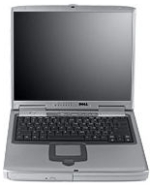Processor |
Intel Pentium 4 processor at 2.0 GHzOn-die 512 KB cache8 KB Internal Cache (L1) 400 MHz processor side BUS This processor is fully supported by the linux kernel. Distro users should use i686 packages for maximal performance. Related Kernel Options: CONFIG_MPENTIUM4. |
Monitor |
|
200N: 15" XGA TFT (Resolution 1024x768) 250N: 15" Super XGA+ TFT (Resolution 1400x1050) For redhat users, you can configure xwindows to use this monitor by simply selecting "Generic Laptop Display" with the appropriate resolution from above while running the redhat xf86config tool. For debian users, you can try my config file. (If you are using a Dell SmartStep 250N, you will need to change this file to support higher resolutions so edit the "Screen" Section). |
Graphics System |
|
Intel 845 AGP ControllerThe standard linux kernels (atleast versions 2.4 and 2.6) have full support for this AGP controller. Use agpgart and the Intel I810 modules.Related Kernel Options: CONFIG_AGP, CONFIG_AGP_INTEL
ATI Radeon Mobility M 6 (32 MB NVRAM) Graphics CardXFree86 has drivers for ATI radeon-based cards (use the "radeon" driver) -- see my config for example. The kernel also supports radeon framebuffer devices (if you don't know what I'm talking about then don't worry about it -- you don't need framebuffer functionality).Related Kernel Options:CONFIG_AGP, CONFIG_AGP_INTEL, CONFIG_DRM, CONFIG_DRM_NEW, CONFIG_DRM_RADEON (and CONFIG_FB, CONFIG_DUMMY_CONSOLE, CONFIG_FB_RADEON, CONFIG_FBCON_CFB32 if you want to enable framebuffer devices). |
Input Devices |
|
Synaptics Touch PadDespite its look, the mouse is PS/2 compatible, so you can use the PS/2 protocol drivers to talk to it. You can, however, get the new Synaptics driver for XFree86, which will enable additional features with the pad, like palm detection, multitap gestures, and more. Note: For those of you using the 2.5 kernels, you will have to download the new driver or pass the psmouse_noext option to the kernel on the command-line for the mouse to work.Related Kernel Options: CONFIG_INPUT, CONFIG_MOUSE, CONFIG_PSMOUSE, CONFIG_INPUT_MOUSEDEV, CONFIG_INPUT_MOUSEDEV_SCREEN_X=1024 CONFIG_INPUT_MOUSEDEV_SCREEN_Y=768. |
Network |
|
Realtek RTL-8139Both debian and redhat support this card out of the box. In fact, the card was immediately recognized by both the distros' network install floppy images -- you will need to create a floppy with the redhat drvnet.img image file in order to have access to the onboard controller during install.Related Kernel Options: CONFIG_8139TOO Intel 537 82801BA/BAM AC'97 56Kpbs ModemThe modem on the 200N works with the driver on this page. It must be compiled from source if you don't use Mandrake, Red Hat or SuSE, and it only works with 2.4 kernels that do not use CONFIG_PREEMPT. I haven't verified this for myself as I don't use modems, but thanks to Joshua Kwan for the note. |
Optical Drives |
|
Fixed Internal DVD ROM (200N)The DVD ROM is supported by all the distros. Playing DVDs, however, is another matter. The filesystem on the DVDs is called UDF, and the movies are stored in MPEG2 format and encrypted with CSS. In order to play DVDs, you need to get a hold of the DeCSS software and a decent dvd player (like xine, ogle, mplayer, etc). Unfortunately, this is all I can say without violating the DMCA in the United States.
CDRW+DVD Combination Drive (250N) |
PC Card Slots |
|
Texas Instruments PCI1250 Cardbus ControllerThe cardbus standard has long been supported on linux, and I have verified that the bridge does work "out of the box" on both the latest Debian and Redhat distributions.
|
Audio |
|
Intel Corp. 82801BA/BAM AC'97 AudioThe Intel I810 ICH drivers work perfectly.Related Kernel Options: CONFIG_SOUND, CONFIG_SOUND_ICH |
Ports |
|
USB: Intel Corp. 82801BA/BAM USBThis is a UHCI controller, so use the usbcore and usb-uhci modules to use the USB ports.
Firewire IEEE 1394 (1): Texas Instruments TSB43AB21 ControllerI haven't any firewire devices at present, so I can't really test firewire support. I have compiled-in support for IEEE 1394, and the kernel seems to identify and initialize the controller so things appear to work. If anyone wants to send me a digital video camera or an ipod, I'd appreciate it. |
| Please feel free to contact me via email (weber@ccny.cuny.edu) or on irc (i'm usually found in #linux on undernet as boolean); your questions will help me enhance this page which will hopefully help other linux geeks. |




Other useful stuff:
Kernel Config (2.4.x)
Kernel Config (2.6.x)
XF86Config
Thanks:
Joshua Kwan
(for still using a modem)
Other references:
Patiño's Page
Darock's Page